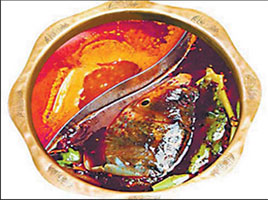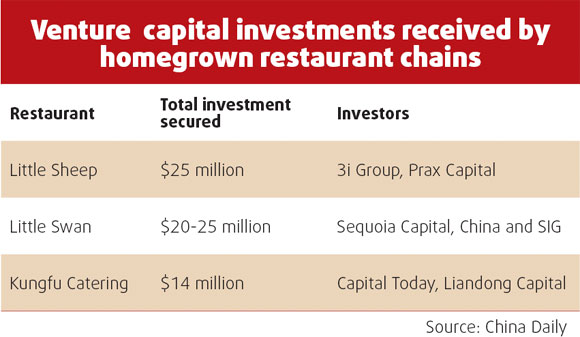

For Tan Changan, the future success of his Tanyoto hotpot restaurant chain lies not in good cooks but in virtually no cooks.
Starting from a 10-seat eatery, the Sichuan native turned a leftover fish head into a famous hotpot delicacy. While franchising was extremely rare a decade ago, Tan used the idea early on to build his hotpot concept into one of China's largest chains.

While most of his counterparts are still trying to grow beyond Mom and Pop shops, since 2001 Tan has spent 20 million yuan to deploy a sophisticated IT management system to oversee his restaurant empire. Over the years, the entrepreneur has been trying to combine a McDonald's management style with Chinese cuisine, which he considers the key to creating a Chinese catering giant.
"I am working to standardize everything in my restaurants, whether it's the ingredients or how the food is prepared," says Tan. "In a few years, there will be no professional cooks in my kitchens, just like KFC and McDonald's."
Runaway cooks, stolen spices
After serving 18 years in the army, Tan returned to Chengdu, the capital city of Sichuan province, to start his own business in 1996. One day, Tan invited his friends to a hotpot restaurant and discovered a leftover fish head was extremely palatable in the stew.
It inspired him to set up his own hotpot eatery featuring fish heads. With just 50,000 yuan in start-up funds, Tan's little restaurant had only five tables and couldn't even afford a separate kitchen.
This unplanned "open kitchen" turned out to be Tan's Holy Grail. In 1996, some hotpot restaurants in the city were discovered reusing the oil in its dishes and Chengdu diners simply decided to stay away from hotpot restaurants in general.
But Tan's eatery was an exception. Thanks to the "open kitchen", customers were able to see everything used in their dishes and enjoy their food with assurance. Moreover, as no one ever used fish heads as part of the hotpot experience, Tan's innovation appealed to diners who were eager to try something novel.
"At peak time, you had to wait more than an hour just to get a seat," Tan recalls with a grin.
The fish heads not only lured gourmands but also copycats. After Tan opened his third shop in Chengdu in 1997, almost every hotpot restaurant in Chengdu was serving fish heads and some competitors even poached Tan's cooks and "several jars of preserved vegetables".
"Before that, I knew little about cooking and simply left everything to my chefs," says Tan. "But when they ran away, the new guys just couldn't get the taste right."
Tan then set to rediscover the lost taste by himself. For a few weeks, he ate nothing but fish head hotpot, looking for the perfect taste and the right ingredients. Once he got back his magic recipe, Tan then insisted every Tanyoto restaurant to stick to it, not only to guarantee the best taste but also to make sure his hotpots would always maintain the same quality, no matter who was (or wasn't) in the kitchen.
As such, every Tanyoto outlet uses the same spices and ingredients, shipped directly from a 300-acre farm it owns in Sichuan and capable of providing a daily supply of five tons of spices and sauces to its national network. Tan also allied with Tongwei Group, a Sichuan-based aquatic product trader, to supply fish heads for his outlets across nation.
Homegrown franchisor
After Tan earned a name for his hotpot in Chengdu, one of his friends suggested he to go to Beijing with his fish heads. Without money to open the restaurant on his own, Tan set up a joint venture with his friends, in which Tan got a stake for the management he provided.
Tan's Beijing outlet became a runaway success and businesspeople from across the nation approached Tan about similar joint ventures. Now, Tan has 117 outlets across the nation, including three in Hong Kong and two in Taiwan. Among them, 80 are joint ventures, in which Tan invested nothing but brand and management expertise.
"A few years later, I got to know what I did is franchising," says Tan. "Rather than learning from the textbook, we learned it by doing it."
It's no easy task to manage the fast-growing restaurant chain. For example, as Tan's empire grew, telephone and fax bills continued to soar. And sometimes the phone and fax bills even accounted for 50 percent of Tanyoto's operating costs,
Thanks to the computer skills he learned in the army, Tan decided to resort to IT technology for a solution, just like some of his foreign counterparts. From 2001, Tan has invested 20 million yuan to build a software management system to ensure Tanyoto's smooth operation.
Presently, Tan not only holds online videoconferences with his local managers every week but also checks the sales records of Tanyoto outlets on his computer daily. Each month, the management system generates a detailed report showing each outlet's net revenue, employee turnover and top-selling dishes, all of which help Tan identify the weak links in the business.
"The figures tell a lot," says Tan. "If there is anything irregular in the figures, I will call the outlet manager or send people to check it out.
"For me now, managing the chain is like reviewing math homework," says Tan, adding he is planning a major update to his system, in order to put it on par with the likes of McDonald's and KFC.

(China Daily 03/17/2008 page12)













